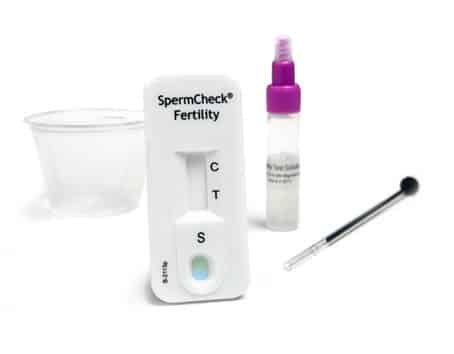Fertility tests for women have graced drugstore shelves for quite some time, but according to medical statistics, approximately 40% of all infertility problems are due to male infertility. This, of course, means that 40% of infertile couples will receive no help in determining why they can’t conceive with a female fertility test. The solution? A male fertility test.

SpermCheck Fertility, a fertility test for men, is scheduled to hit drugstore shelves in April. Already sold online by Walgreen’s and CVS, drugstore companies believe that men will opt for a home test to determine if they are the source of fertility problems, rather than scheduling an expensive urology appointment.
“There is nothing like it on the shelf,” Maeve Egner of Fusion Marketing, the company hired to help promote the new fertility test stated. “It’s plugging a gap.”
To use the $40 kit, the male simploy mixes his semen with a special solution already included in the kit. The sample is then dropped onto a testing strip and the test will then give a reading. If a reddish line is displayed on the kit, the male sperm count is above 20 million per milliliter – a normal sperm count. If, however, no color is displayed, the test advises the man to “consult a physician about a complete fertility evaluation.”
But not everyone is enthusiastic about the new test. According to some fertility experts, there is more to male fertility than just the sperm count.
“There are four major things we look for,” stated Dr. James Goldfarb, a fertility specialist at UH Case Medical Center in Cleveland: The number of sperm, their shape, their mobility, and the volume of the ejaculate. “This test only measures one thing.”
And if sperm count is considered to be “low normal,” which would register as low, the male may still be able to produce offspring if other factors are in place.
“The biggest risk of this test is that a guy who gets a very low sperm count might panic and end up getting more intervention than he really needed,” Goldfarb stated. “It might reassure some couples, but it might scare some couples, too.”
Even worse, Goldfarb says that sperm count can vary from one week to the next, meaning that a man may register low on the test one week, but had he performed the test the week after or before, he might have tested normal. This could also cause panic.
And panic may not be necessary, according to experts like Goldfarb. He says there are methods used in male infertility problems that can help couples conceive naturally if sperm counts stay continuously low. And since that can vary from one week to the next, the counts would be monitored by a physician. If that doesn’t work, then further action is taken to help couples conceive.
“First we would look for anatomical problems,” Goldfarb stated. Anatomical problems can include a wide range of problems, including varicose veins in the scrotum or penile blockages that may be stopping sperm release. “Then we can look at hormonal things…If the problem can’t be found or corrected, the simplest solution is to concentrate sperm and do intrauterine insemination. That way, there are more sperm getting closer to the fallopian tubes.”
If that doesn’t work, the couple can then try in vitro fertilization.
We always try the simpler things first,” Goldfarb stated. “But if the couple is willing to be very aggressive, then we can still get a good pregnancy success rate, even if a man has a very low sperm count.”
Related Articles:







Identifying the cause of a male infertility is as much an art as a science. This infertility test kit is good but limited to simply identifying the sperm count of male. But they can always visit a doctor for more test and to identify what the problem really is and options to treat infertility.